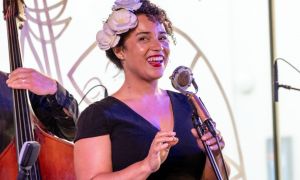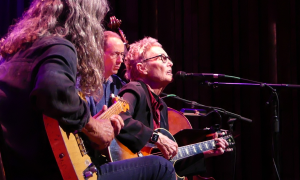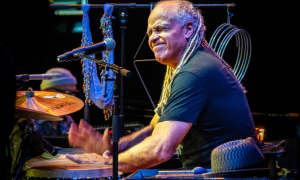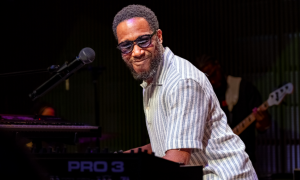Home » Jazz Articles » Live Review » Vision Festival 2009: Day 5
Vision Festival 2009: Day 5
Seth Meicht's Big Sound Ensemble / Bear and Eagle / Darius Jones Trio / Matthew Shipp / Rob Brown Trio / Milford Graves Quartet / Lisa Sokolov Trio / Joe Morris GoGo Mambo
14th Annual Vision Festival
Abrons Arts Center
New York City
June 13, 2009
As in previous years the Saturday afternoon of the Vision Festival has been given over to what have been termed emerging artists, with three sets to whet the appetite for the evening's main course. Inevitably the crowd is sparser, bringing out the real hard core alongside friends and well-wishers, but the music can be of no lesser quality than the established names and so it proved today with impressive sets by Seth Meicht's Big Sound Ensemble and the Darius Jones trio. Later performances kept the standard high with Matthew Shipp's solo set, Rob Brown's new trio and the debut of the Milford Graves Quartet being particularly noteworthy.
- Seth Meicht's Big Sound Ensemble
- Bear and Eagle
- Darius Jones Trio
- Matthew Shipp
- Rob Brown Trio
- Milford Graves Quartet
- Lisa Sokolov Trio
- Joe Morris GoGo Mambo
Seth Meicht's Big Sound Ensemble

Seth Meicht
Starting things off with a big bang was Philly area saxophonist Seth Meicht's Big Sound Ensemble. Meicht who studied with 
Odean Pope
saxophoneb.1938

Michael Brecker
saxophone, tenor1949 - 2007

James Carter
multi-instrumentalistb.1969

Ravi Coltrane
saxophone, tenorb.1965

Byard Lancaster
saxophone1942 - 2012
Opening with a tight big band unison, the eight piece ensemble blasted through the signature "Big Sound," by way of a fluid left field solo from Matt Bauder's alto saxophone and a volcanic outpouring from Swell, immediately alerting listeners that something was happening here. A thought confirmed by the simultaneous soloing on "River Watch" and the duet introduction to trumpeter sibling Aaron Meicht's "Obase The High," where the Meicht brothers traded in small blurts, building to distorted squawks, with Seth pointing his tenor saxophone to the heavens, while Aaron stepped agitatedly from foot to foot.
The centerpiece of the performance was the lengthy "The Sounds We Make," featuring Charles Evans' sinewy baritone sax and an extended workout for Bauder's alto. Starting with strangulated cries over a spare backing from Adam Lane's bass, the altoist gradually became more and more pointillist and distorted, in a reversal of the normal convention for solos. After breathy multiphonics, a passage of circular breathing and keypad popping produced two simultaneous lines, as a bucolic horn choir amassed behind him. Following an impassioned tenor saxophone outing for the leader, drummer Mike Pride took charge with a furious outburst concluding with a slow deliberate tolling cymbal introducing a dirge-like march theme, with just Pride's drums taking a contrastingly expansive role, akin to cracking jokes at a funeral.
Their set was a big surprise and one of the highpoints of the Festival, so it's good to hear that a live recording for CIMP is programmed for the autumn. And what a great way to energize the brain cells and get in the right frame of mind for the long day ahead.
Bear and Eagle
Catherine Sikora and Jeremy Bacon's duo Bear and Eagle was a spacious extemporized duet for tenor saxophone and piano coming out of the Bill Evans vernacular, meaning lots of listening, harmonically rich improvisations, and bags of invention within comparitively straightforward parameters given the Vision setting, showing definite promise for the future.

Alto saxophonist Darius Jones (pictured on left) had assembled a mighty band for his afternoon performance with the legendary 
Cooper-Moore
piano
b.1946
Swaying from side to side with a blissful expression on his face, Jones soulful alto soared over Cooper- Moore's gentle piano introduction and Moses nuanced brushwork in a rhapsodic opener titled "Forgive Me". Another soaring theme generated more impassioned alto from Jones, with stormy drums and piano getting wilder as the leader's long lines spiraled up through the registers, culminating in anguished alto cries. By this point Cooper-Moore was taking no prisoners, sweeping up and down the keyboard, using elbows and forearms in his quest to extract sufficient sonic mass from the 88 keys to match the fierce mayhem wrought by Jones and Moses.
For the next piece Cooper-Moore switched to his home-made diddley-bow to set up a down and dirty bass line, with suitably funky accompaniment from Moses thick red drumsticks, and Jones threading his hoarse shouts in and through the rhythm. Jones showed great energy throughout, building on repeated lines, lurching backwards and forwards, expelling a litany of strangulated hollers, wavering squeaks and mewls. Moses measured resourceful playing left more than one listener wondering why he's not heard more around town. It all combined for a great set sadly cut shorter than it could have been by the pressure to prepare for the evenings main course.
After a couple of hours break the evening got underway with a solo set from 
Matthew Shipp
piano
b.1960
Notwithstanding a gentle start, Shipp was soon boxing with the piano with a sequence of left jabs, his hands flying off the keys as if they were too hot to touch. He played with a continuous nervous energy which intermittently transmitted itself to his hands and even his legs stamping on the sustain pedal as he pounded the keys in one passage. Shipp dealt in repeated motifs subjected to immeditate transformation ,with insertion of almost none of the themes which pepper his solo and trio excursions, highlighting the high degree of invention at hand.
Passages of romantic, almost neoclassical, piano made connection with jazz through their rhythmic syntax and variation in dynamics. Shipp approached the piano in distinctive style with circular movement of his hands stemming from the shoulders. At some points he pawed at the notes as if trying to gain a fingerhold, then almost rubbing the keys with a featherlight touch before disrupting the flow with resounding crashes. Towards the end the lovely melody of "Patmos" from One (Thirsty Ear, 2007) emerged to be subjected to further investigation. Searching almost obsessively among the flying motifs and patterns for the next signpost on his journey, Shipp was reinventing the solo piano tradition as he went along. A final flourish uncharacteristically reminiscent of Cecil Taylor brought his excellent set to a conclusion and a well-deserved standing ovation.

With the bar set high, taking on the next set was a challenge which alto saxophonist and composer 
Rob Brown
saxophone, alto
b.1962
Craig Taborn
piano
b.1970
Nasheet Waits
drums
b.1971
An involved piano/alto unison over clattering drums quickly gave way to diverging lines as Brown took off on a quicksilver exposition in a wonderful high energy opener. As Brown peaked with sustained high falsetto wails, drums and piano were in hyperactive support, with Taborn's hands galloping up and down the keys. Waits was very busy but always precise and cleanly articulated. At one point he hit his ride cymbal so fast it hardly had time to vibrate, in a masterful display of the percussive arts.
Brown's marvelously inventive lines were controlled in delivery and nuanced in tone, with his trademark edge of controlled distortion close at hand to color almost every note he played. Over recent years he has added a forcefulness to the tender side of his sour sweet storytelling which really came to the fore tonight. In Taborn he has found the perfect partner whose ability to pursue separate lines in each hand can mirror Brown in compelling invention. His solo on the second piece was a case in point. After a bluesy start, he slowly chorded with his left hand, while his right raced away fingers dancing, skittering and stabbing, culminating in a breath-taking sequence of ominous two handed lines.
This was a powerhouse group, reaching screaming intensity at times, but allying that strength with wisdom in its use. Everything came together at the conclusion of the set as Brown's initially quizzical line built to a searing crescendo, with Taborn hammering the keys and Waits pounding his kit for an emotionally charged passage of amazing potency. Another standing ovation was their due for one of the high points of the Festival.

Milford Graves
There was a palpable sense of anticipation before 
Milford Graves
drums
1940 - 2021
D.D. Jackson
piano
b.1967
Don Pullen
piano
1941 - 1995
Graves is something of a showman, even carrying band members around on his shoulders in previous performances. Tonight they all remained tied by the force of gravity, and the drummer's theatricality was restricted to his entrance. On a home-made talking drum, Graves began in the wings, before circling the stage as he played until concluding with a puckish "Good Evening." After positioning himself behind his customized kit he launched a tumultuous pounding, speaking in self-invented tongues in accompaniment. Jackson slipped onstage and began beating the hell out of his piano, with Graves looking delighted. Jackson rocked backwards and forwards as he assaulted the piano in a display of amazing high energy playing. Graves summoned first 
William Parker
bass
b.1952
Graves leavened his ferocious power with a distinctive timbral palette courtesy of his customized kit, but he also demonstrated an uncanny ability to maintain separate rhythms on different parts of his kit, so at times it sounded as if there were at least two drummers involved. Though the group generally operated at flat out intensity, it was like a spicy meal where you can still taste the full range of flavors once you get used to the heat, with shifting patterns revealing themselves to the discerning listener within the overall tumult. Parker's approach was similar to his tactic with 
Cecil Taylor
piano
1929 - 2018
Graves took time out to talk about the three generations of musicians in the band, with Langford the youngest member, and how musicians from the 1950s and '60s could be a timely inspiration to the younger generation in showing that you can do it for yourselves. Langford held his own without overpowering, building with short gobbets of overblown sound, trading licks with Jackson and even finding space for more delicate whinnies. Jackson clearly relished the challenge to ensure he was heard, supplementing his strong runs with block chords, flats of hands and elbows as necessary to get his point over. A wonderful rousing set and yet another well-merited standing ovation.

There was a thinning of the ranks at this late hour, but 
Lisa Sokolov
vocals
b.1954
Some of her vocal mannerisms, including a sort of childish whine were off-putting, but it was an otherwise strong display, with her voice strident, sweet, soaring and tender by turns. For "Haiku You," her conversational delivery was able to incorporate "the lady has a green light" as she received the signal that she had five minutes to go in a set which received a standing ovation from a sparse but discriminating audience.
Though there were some improvements in time keeping, the 
Joe Morris
bass, acoustic
b.1955
There was strong soloing from 
Steve Lantner
piano
Tony Malaby
saxophone, tenor
Jim Hobbs
saxophone, alto
Thelonious Monk
piano
1917 - 1982
Even at the end of a long but fulfilling day's music, there was still sufficient promise in the following night's bill to whet the musical appetite. Rob Brown was to return as part of the Planet Dream collective and AACM veteran 
Fred Anderson
saxophone
1929 - 2010
Hamid Drake
drums
b.1955
Whit Dickey
drums
Eri Yamamoto
piano
Peter Brötzmann
woodwinds
1941 - 2023
Photo credits
John Sharpe and Frank Rubolino (of Milford Graves)
Day 1 | Day 2 | Day 3 |Day 4 | Day 5 | Day 6 | Day 7
Tags
Comments
PREVIOUS / NEXT
Support All About Jazz
 All About Jazz has been a pillar of jazz since 1995, championing it as an art form and, more importantly, supporting the musicians who make it. Our enduring commitment has made "AAJ" one of the most culturally important websites of its kind, read by hundreds of thousands of fans, musicians and industry figures every month.
All About Jazz has been a pillar of jazz since 1995, championing it as an art form and, more importantly, supporting the musicians who make it. Our enduring commitment has made "AAJ" one of the most culturally important websites of its kind, read by hundreds of thousands of fans, musicians and industry figures every month.








 Buy Now
Buy Now





















